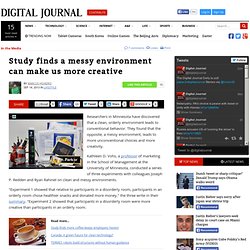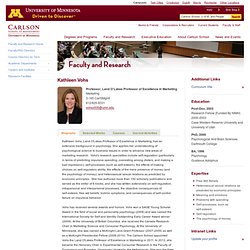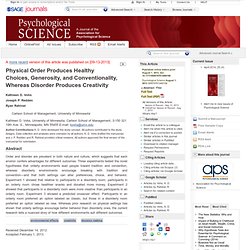

Study finds a messy environment can make us more creative. Researchers in Minnesota have discovered that a clean, orderly environment leads to conventional behavior.

They found that the opposite, a messy environment, leads to more unconventional choices and more creativity. Kathleen D. Vohs, a professor of marketing in the School of Management at the University of Minnesota, conducted a series of three experiments with colleagues Joseph P. Redden and Ryan Rahinel on clean and messy environments. "Experiment 1 showed that relative to participants in a disorderly room, participants in an orderly room chose healthier snacks and donated more money," the three write in their summary. Read more... "Experiment 3," they write. Kathleen Vohs - Faculty Profile - Carlson School of Management. Kathleen Vohs, Land O'Lakes Professor of Excellence in Marketing, has an extensive background in psychology.

She applies her understanding of psychological science to business issues in order to advance new areas of marketing research. Vohs's research specialties include self-regulation (particularly in terms of predicting impulsive spending, overeating among dieters, and making a bad impression); self-processes (such as self-esteem); the effects of making choices on self-regulatory ability; the effects of the mere presence of money (and the psychology of money); and heterosexual sexual relations as predicted by economic principles.
She has authored more than 150 scholarly publications and served as the editor of 8 books, and she has written extensively on self-regulation, intrapersonal and interpersonal processes, the objective consequences of self-esteem, free will beliefs, bulimic symptoms, and consequences of self-control failure on impulsive behavior. “Yes, but Are They Happy? Physical Order Produces Healthy Choices, Generosity, and Conventionality, Whereas Disorder Produces Creativity. Kathleen D.

Vohs, University of Minnesota, Carlson School of Management, 3-150 321 19th Ave. S., Minneapolis, MN 55455 E-mail: kvohs@umn.edu Author Contributions K. D. Vohs developed the study concept. All authors contributed to the study designs. Abstract Order and disorder are prevalent in both nature and culture, which suggests that each environ confers advantages for different outcomes. Article Notes Declaration of Conflicting Interests The authors declared that they had no conflicts of interest with respect to their authorship or the publication of this article.
It’s Not ‘Mess.’ It’s Creativity. Does having a neat or sloppy desk influence the way you think? There seem to be two types of people in the world: those who keep their desks neat and those who don’t.

Now, new research shows that whether your desk is messy or tidy may influence how you think. In a study published in the journal Psychological Science, researchers found that working at a clean and tidy desk promotes socially acceptable behaviors, like generosity and healthy eating, whereas working at a sloppy desk promotes out-of the-box thinking and an openness to new ideas. While previous research has indicated that different personality types lean towards order and disorder, researcher Kathleen Vohs and her colleagues at the University of Minnesota wanted to see if different types of work environments would promote different behaviors, regardless of personality type. In the first experiment, participants were asked to fill out questionnaires, unrelated to the topic of the study, in one of two offices.
In a second experiment, the researchers sought to test creativity. Clutter, Conformity and Creativity at Work.